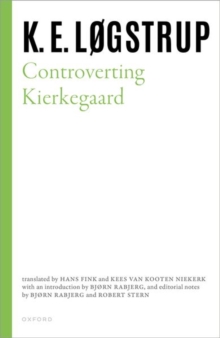
Controverting Kierkegaard PDF
by K. E. Logstrup
Edited by Bjorn Rabjerg, Robert Stern
Part of the Selected Works of K.E. Logstrup series
Description
This is the first English edition of a major work by the Danish philosopher and theologian K.
E. Logstrup (1905-81). It is the culmination of his critical engagement with Kierkegaardianism, which had begun almost 20 years earlier.
In this text, Logstrup focuses on four main themes in Kierkegaard: his understanding of Christ and thus of Christianity; his understanding of suffering in human existence; Christian vs. secular ethics; and Platonistic influenceson Kierkegaard's position, which Løgstrup characterises as nihilistic. Løgstrup presents his own alternative conception in response: that Christ revealed universal ontological ethical structures that put Christians and non-Christians on a par; that suffering is a basic human experience and so there is no such thing as a particular Christian suffering; that sovereign expressions of life such as trust, sincerity, and compassion are the fundamental phenomena of ethics that enable our lives to function, and are thus given as a gift of creation, not of faith; andfinally that human existence as created is meaningful and holds value and so is not a Kierkegaardian 'nothingness' of mere relativity.
As well as offering a classic and yet controversial critique of Kierkegaard, this text also develops Løgstrup's conception of the sovereign expressions of life, which wasto become central to his later ethics, further deepening his distinctive understanding of the human condition.
Here translated in full for the first time, it will now be possible for English-speaking readers to explore the issues that drew Løgstrup into his controversion with Kierkegaard.
Information
-
Download - Immediately Available
- Format:PDF
- Pages:240 pages
- Publisher:OUP Oxford
- Publication Date:28/04/2023
- Category:
- ISBN:9780198874775
Other Formats
- Hardback from £60.00
- EPUB from £42.50
Information
-
Download - Immediately Available
- Format:PDF
- Pages:240 pages
- Publisher:OUP Oxford
- Publication Date:28/04/2023
- Category:
- ISBN:9780198874775










